Interview with Ullenka
VeganOrigo: How has veganism come into your life?
Ullenka: Well, when I was about 15 years old, I met the vegetarian idea of eating plants for health. I was still living with my parents and I started to notice that I gain weight. I ended up not liking myself too much, and then I discovered I can actually eat a little bit different than the others, and I might look better. I tried to eat vegetarian, but I didn't know the difference back then. I was avoiding a lot of thing: eggs, dairy but I was eating some fish and mostly I had lots of plants, so I was very close to being vegan. I just didn't know all the rules and it was a long time ago so I didn't have support back then. After about four years, I just slowly went back into regular diet. I was just being kind of tired of it, because I was always making trouble for everyone with what I eat and what not. I went into my adulthood eating just as everyone else, plus learned to have alcohol, coffee and cigarettes, in moderate but still. I had no problems until at some point I became a mom. My first born - Maya, was a crying baby and her allergies ruled our life since pretty much the very beginning, but I was able to keep it under control. Few years later after having my first son Travis, Maya started to get different health issues with her skin. No doctor told me that diet actually matters about it, and they just wanted me to switch from common milk to goat milk. For several years I was trying different things and at some point when Maya was really sick, we went to do a blood test and that was the first place that someone told me that diet really is very important to get health back. Our family started to eat much more plants. We completely removed meat and dairy from our diet and that lady also gave me recipes for good diet with mostly cooked vegan foods with lots of GF grains, but she recommended once a week to have fish. We continued that for about a year. I didn't see much result, it was not getting any better, but at least it wasn't getting worse, and I knew there was something around that. So I tried to look up several different things. I still got lost. We went back to eating meat, for just a very short time, according to my new idea of trying different diets for healing kids gut and digestion, for example: GAPS, SCD, Candida Diet etc, and each one for about 2-3 weeks. Finally, when I was very desperate, I came across a girl who was explaining in a video how she healed with eating just fruits and then I googled a lot of things. It took me several weeks to actually figure this out, but making the story short, I found community on Instagram. Instagram was the first place that really opened my eyes, that there are a lot of people who actually live off just plants or even raw, or even just fruits. I was shocked at first. So I explored that area a lot and I made a lot of friends and we'd just started from there. It just felt good of never going back to prepare the meat anymore, because I’ve always hated making dishes with meat. (You can follow Ullenka on Instagram).
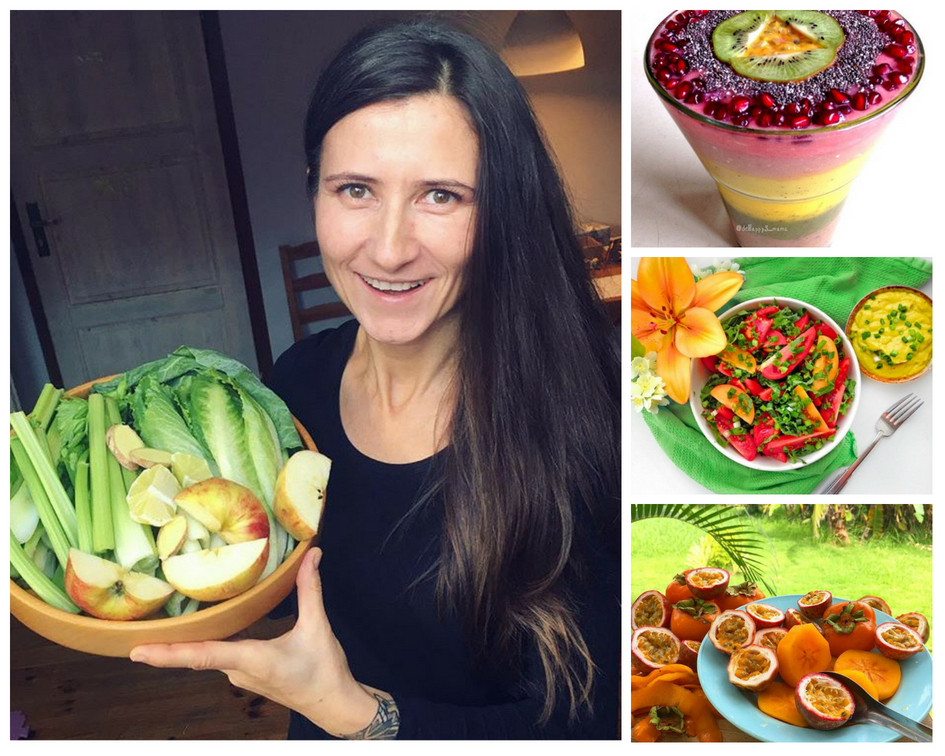
V: What was her problem, and what was the healing process?
U: My three kids suffer from eczema, which is a skin disorder. Well, that's how doctors call it, but it's not a skin disorder. It's a symptom of problems inside with digestion, and my son has autism. Lots of problems from the past were coming basically from me. My body was not clean inside and that's why my kids have those problems, they kind of carry on, so they were probably loaded with lots of heavy metals and stuff. This is how the healing process started, with me wanting to detox them, then I found that actually plant based diet is very helpful, especially eating a lot of raw foods. I was looking for the right diet and I was constantly trying to battle the Candida, parasites and all this kind of things. Once we started the vegan diet, I jumped actually straight to the raw food diet, which is kind of not recommended for someone who is new to this. At the time I didn't know that, but fortunately we were vegetarians for about a year prior. A person should be following some transition. The whole process took about five- six months for Maya to heal. She went through a short period of detoxing at the beginning, a lot of stuff that was just circling and she didn't have enough of nutrients or enough water to remove that and once you gave the body fresh fruits, it just easily releases a lot of things. After a few weeks she started to heal and by six months her skin was 90-95 percent clear. For another two years I could see her body still detoxing periodically, just a small flare for a few days, sometimes for two-three weeks and gone. Today she's healed completely and she can even eat gluten without reactions, which she was never able to. As she is a kid and curious she tried regular candy, so we went through some videos, and now she knows about the whole meat and milk industry. I taught her how to make her own good, healthy candy. Right now I know she could go back to a regular diet and getting away with that for a while, which she understands and doesn’t want. Sum this whole thing up, it took five years of very clean diet, I was very persistent, and now she is completely healed.
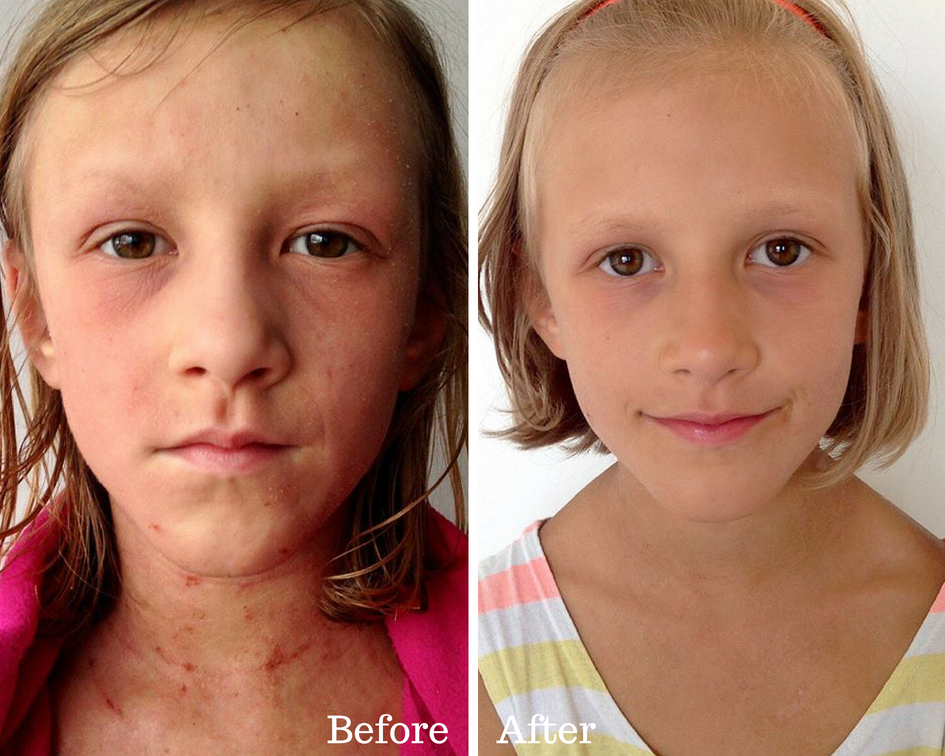
V: How did she handle the whole process as a child?
U: She's been dealing without a lot of trouble since she was about four years old, so she was used to having it. She kind of didn’t realize it, until she was about 9, when she already started to heal. By the time she was okay, she didn't really care. She handled it very well. There were some hard moments when she was three, four years old. Kids at this age are hard, right? They don't want to cooperate. But what helped was that we all together, as a family, ate the same way. It was massively helpful. She just kind of used to it and after a while it was normal.
V: What did you, as a family, eats and what do you still eat?
U: Before the vegan diet, we didn't eat any fruit for almost a year. My kids have been out of fruit because the lady at the blood test told me to give them lots of cooked vegetables and some grains, so they were eating only one apple a week. Once I told them that starting tomorrow, we gonna eat a lot of fruits, they got excited that they didn't care about anything else. So the beginning was already easy. They were laughing, screaming and just eating a lot. Even till today they just get excited when I cut the watermelon open. Basically what we eat: lots of fruits in the mornings and usually for lunch as well, unless we don't feel like to eat another bowl of fruit. Then I make either a soup or some steamed vegetables, just something veggies. Whenever I make cook food during the day, I never go back to raw fruit again the same day. This is my number one rule. For dinner I make something with veggies. We really like them and sometimes I make sprouted grains, like buckwheat. On a casual weekday we eat raw and then lots of vegetable raw or steamed. Really simple.
V: When you eat raw, you eat a fruit in the original form or you prepare dishes?
U: With three kids I often make the simplest. I just chop things and if we make a soup, I just put them in water, I bring them to boil and I just turn it off and the soup is ready. We make smoothies. They are good for beginners, because you can put anything in them. It is not the smartest to have smoothies all the time, but once a day it's fine. Actually allows you to eat lots of leafy greens in them. I like eating a lot of fruit just as it is, if I have pineapple today, I do enjoy it on its own, instead of mixing it, then the next day I'll eat mango, then the next day I'll just have oranges as a juice. It is easy to have different breakfast this way for a week. Anyone who wants to start eating more raw food, I recommend starting with fruit for breakfast and lunch, and sweet potatoes with salad or vegetable soups for dinners. Something that is considered pretty good for you to transition to a fully raw diet. My dinner sometimes is just a large green juice, I like the fact that I can make it fast and don’t spend hours cooking. With 3 kids it would have been very hard for me to make casual food from scratch daily, especially knowing my kids big appetite!
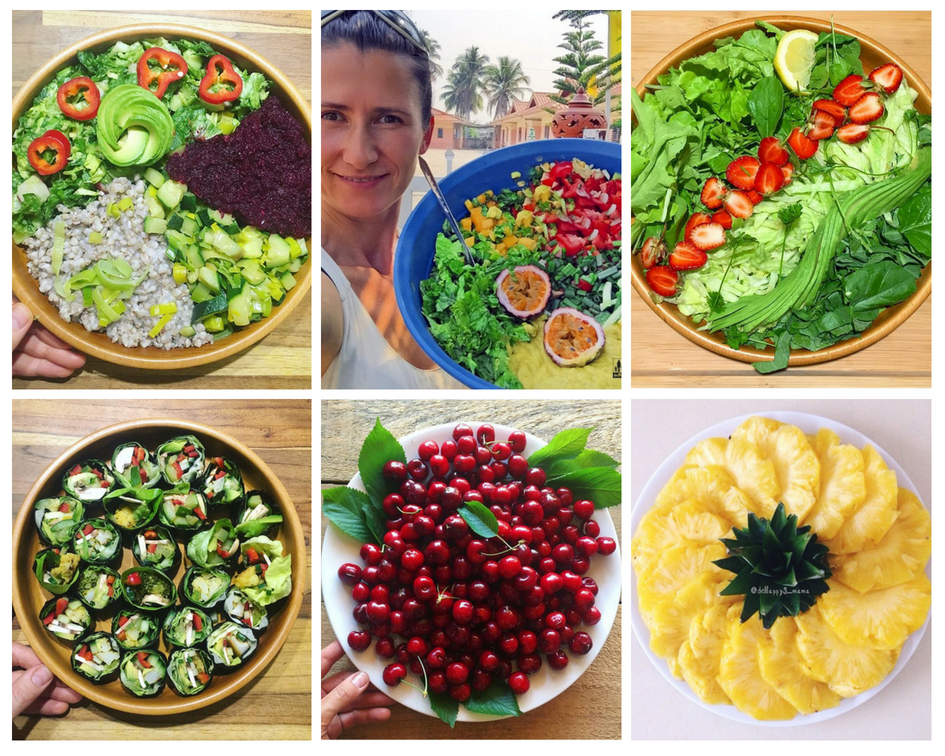
V: Once I was fully raw for a week, and I love fruits, but I don’t have a sweet tooth, so for me all those sweet flavors were just simply too much.
U: The best combination is to eat lots of vegetables. Fruits in the morning. Also, the older we get, the less we want to eat fruit all the time. I like veggies, and I never make the same recipes, I just improvise and make something easy.
V: Please tell me about your e-book.
U: I published Maya’s results on social media to share how my kids got better. I was just so excited that she got well, but I was scared to show her before pictures, because she looked horrible and I didn’t want people to hurt her, but the opposite happened. I was afraid of the reactions and what I finally got was something I never expected. People really started to give me so much love and support. Then so many people asked me “How did you do it? What can I do? Can you explain?” I tried to respond and help everyone, but it was just so overwhelming. It was too much, so I started to write a blog, but it was too long for the blog. After a while people still didn't get everything in there and I started asking myself “What else can I do to help them?” Then someone told me “You should write an e-book” It took me about five months to write everything down. I researched a lot of information. I based most of the actual raw food diet principles on Dr Graham’s book The 801010 Diet and I recommend his book to read as well because I don't actually copy his technical information. The e-book solves a lot of problems, and helped me to give someone the advice in a pill, in a concentrated form, so I don't have to answer the same questions a hundred times.
V: Where is it available?
U: It is available on my website. I didn't put it on Amazon I wanted to have a closer relationship with my readers.
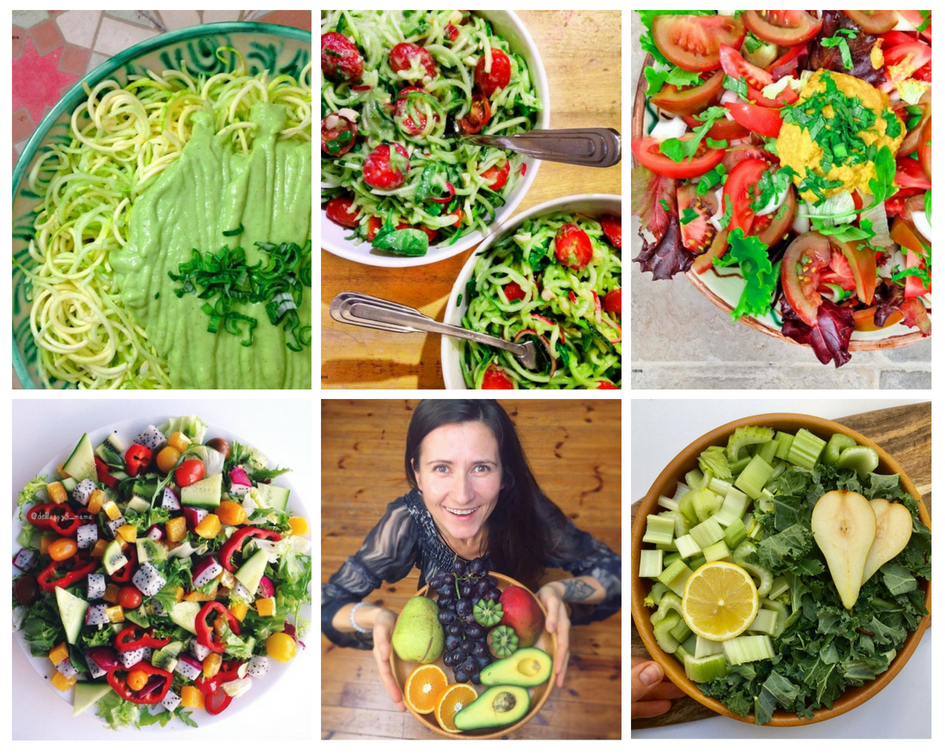
V: What are the feedbacks?
U: In the book I explained what I did to help my kids and what the raw food diet is all about. I also give a lot of tips and advice about how to start, how to make it work in practice, just from a perspective of a momma. I was writing it just from my experience. I am working on a new version of my book at the moment, which everyone who bought the original version can get for free. Many people wrote me their results. When someone read the book and did exactly what I told them to do, they got the results, but many people also feel like it's a little bit difficult, because I do not include the transition to raw diet. So I found the answer to that question and I wrote a transition book, focused on doing a body reset that prepares for eating raw. I specifically wrote it and recommend it to people who struggle with more severe eczema and stubborn detox that seems to be stuck. It's called Ullenka’s Green Fix and it allows a person to reboot their body and transition more gently to the raw diet for healing. There will be a whole series available; I am preparing the third book (still going back with the process) about Optimal Diet, which is going to help everyone who just recently started to eat vegan or vegetarian for health and attempt to heal their eczema through food. This book can be helping those who have mild eczema and just want to eat healthy and well. But it also will prepare those who have a long journey ahead and need to go through the entire process all the way to raw diet. I found that the best results people get, when I closely work with them for a certain period of time. They get feedback from me, they share what they eat and I am able to correct them anytime they approach a roadblock. I am mentoring individuals and mothers of children with eczema, helping them to follow the path. We talk 1 time per week over Skype and I am available on chat anytime they need my support. It does work very well and I treat my clients as they were family. They are absolute priority for me. Most of them who are pass the process stay in touch and we are friends until today, sometimes having a little conversation online. I love all my eczema survivors :) we are growing in numbers.
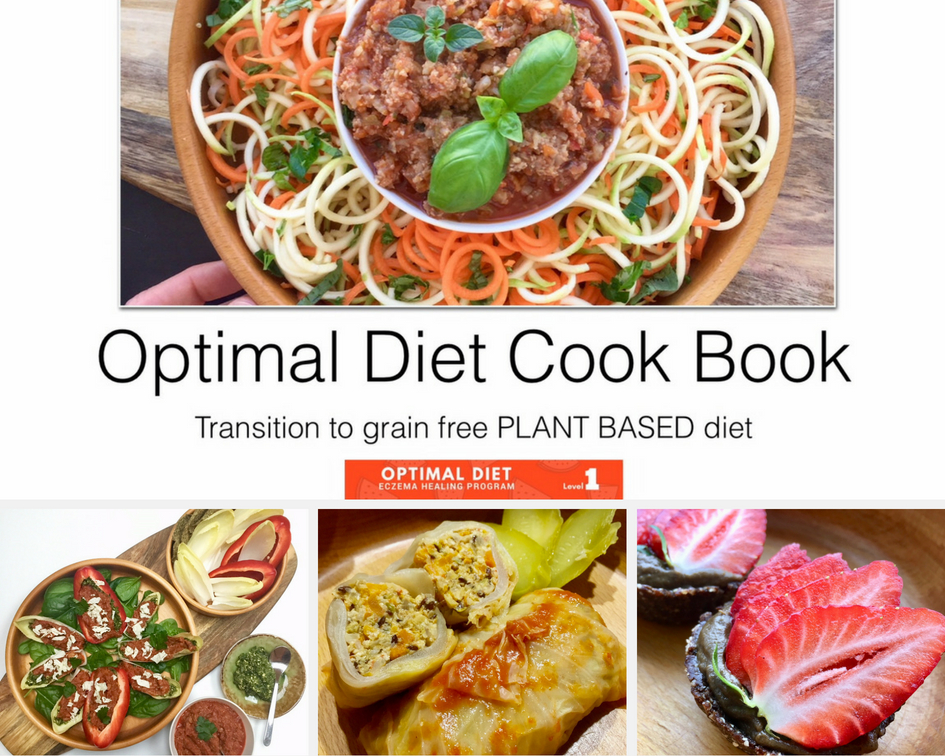
V: What is your eczema program?
U: This is something that I have recently started to help even more people, I just have two hands. I'm right now leading a second group of Ladies from all over the world. I have women from: India, Norway, Portugal, USA, Qatar, England and Poland. We meet online once a week over the period of 18 weeks. There are three levels of the program; each one has three modules of transition. It starts from learning to eat clean vegan diet and the whole process evolves through several stages, to make sure the body is slowly releasing the toxins that were carried for years. We start with a very healthy diet and then go through the detox. I help them to fix the way they eat, because they have lots of bad habits, one thing we do not learn at school is to how to take care of our diet and stay healthy. My protocols are simple; I use only what Mother Nature recommends. No supplements just fruits, vegetables, herbs and juices. The magic is to know when to change the protocol and what to eat at a certain stage, how to balance the detox and when to continue or when to move on to the next element. I am able to recognize and to guide through that. Our body is a complicated machine, simple solutions work, but things take time. Rome wasn’t built is a day. Some people heal earlier, some people later. I am planning to start a new group every 2-3 months. I believe that there is a power in a group and working together while dealing with similar problem, simply supporting each other.
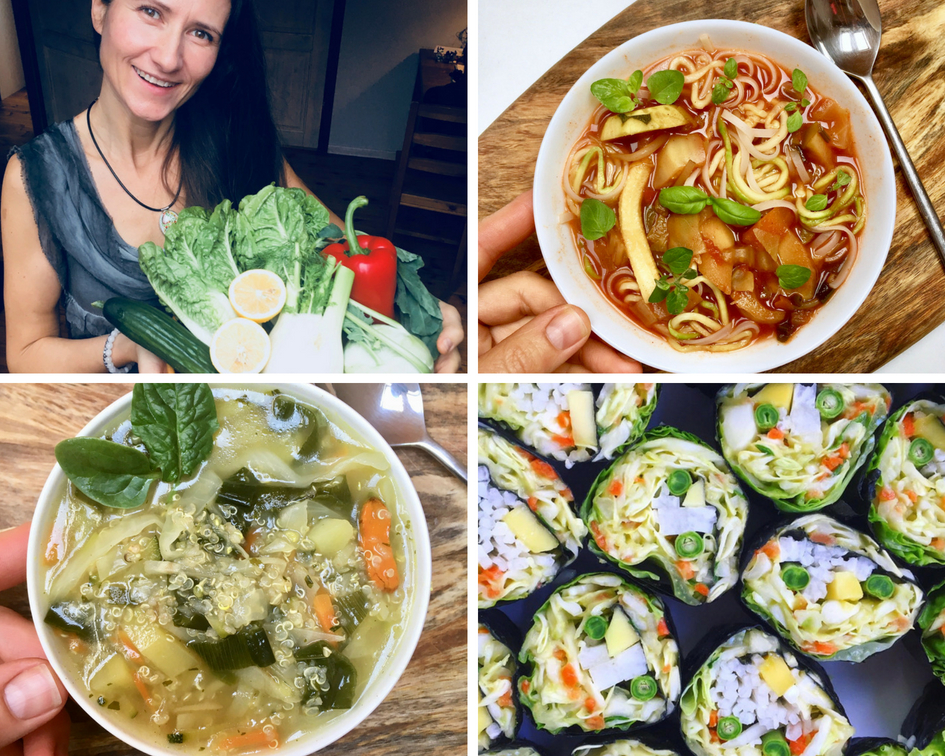
V: How can people apply for it?
U: They can sign up on my website . I offer a questionnaire to fill out that will allow me to take a look at the situation and evaluate approximately how long it will take for the results to come or where to start. Some people go through the program and they still will be in the middle, that's how bad situations are sometimes. Some people will start seeing results much faster, a month in or so. Everything depends on personal situation, the age of eczema and self discipline, support, motivation etc.
V: How do you socialize? What do you do when you go out or you meet your family? How can your children do it? Especially with not vegan friends?
U: Whenever you change, it's always weird at the beginning. After a while it just changes, you become the leader, because they look up to what you're doing. You're changing yourself for better. They saw me healing my kids. When I was starting, I was the one who had to explain everything and at times I kind of feel embarrassed, but I acted I am just doing what I need to do and I am happy with that. I have found a way around that problem and I’ve always had my bag of tricks with me (the whole food stash and even tools!). I would just bring the spiralizer with me or even a blender sometimes and I just made food for other kids, for other people. When I create my big salad I just show others how it's done. That is not so hard. Usually the best reactions I get are from the kids of my friends. They always say “I want the same smoothie as Troy.” Then I just make more smoothies for them or bigger platter of fruit. It's just to be consistent. My friends learned how we eat and what we do and today they ask me for advice. Things turned around for me.
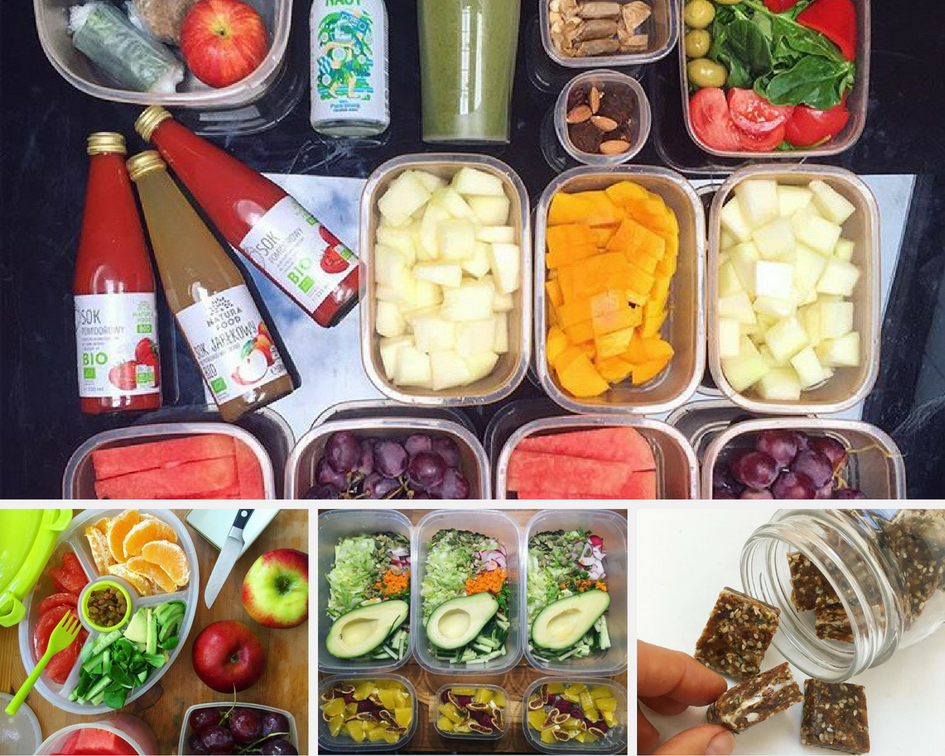
V: Do you have any advice for people who are living in colder climate?
U: I lived for 3 winters eating mostly raw foods and I've lived in a tropical climate as well. So I know the difference. Don’t force too much yourself and if you don't feel like eating too much fruit or raw food, make some soup with vegetables. Especially good vegetables in winter that will keep us satisfied and they are very close to eating raw: all the kind of pumpkins, sweet potatoes and yams. They are good replacements of fruits. So if someone wants to be almost perfect, this is very good idea. I still eat a lot of green leafy at the winter time. I think even if they are not grown in an ideal environment they are still good options. There are some vegetables during winter that stay well: cabbage (a nice cabbage soup), lots of root vegetables (they are very tasty); we can play with them a lot. Keeping fruit in the morning is very important. So that's my advice: having at least fruit in the morning, even in the winter.
V: How do you travel with kids?
U: It depends. If we travel by car, then it’s easy. My car is always equipped with cutting board and knife, couple of bowls. The same way it was natural as a kid having a sandwich, now it is natural having fruits with us. There are plenty vegan snacks now available at almost every corner, for ex. bars made with dates, nuts, seeds and fruits and they are pretty good option when you need energy. You can find good juices; you can find a lot of things these days. I always look at the ingredients and I don't buy anything with ingredients I can’t pronounce or if the list is longer than few things. It's more tricky when we go on an airplane, then I have to prepare some of the things. I would buy a lot of small snacks just in case, because it's a long time and you don't know what's going to happen. I usually bring lots of dates, some nuts, and some dehydrated bars I had prepared. I try to find small bottles of juices, the best quality I can. I always try to choose the lesser of two evils, so kind of like finding little things that are almost perfect. Then I try to bring some fruit but you go for more condensed calories that are easier. So for traveling you can have bananas and not watermelon because we'd need a whole suitcase of watermelons, knife and boxes. Bananas are easy to peel and eat just as they are. Clementines are also good and apples as well. For long time travel and we also even bring some sweet potato or something. Preparation is a key and wanting to stay on track you’ve got to find the ways to make it work for you. Just like I did.
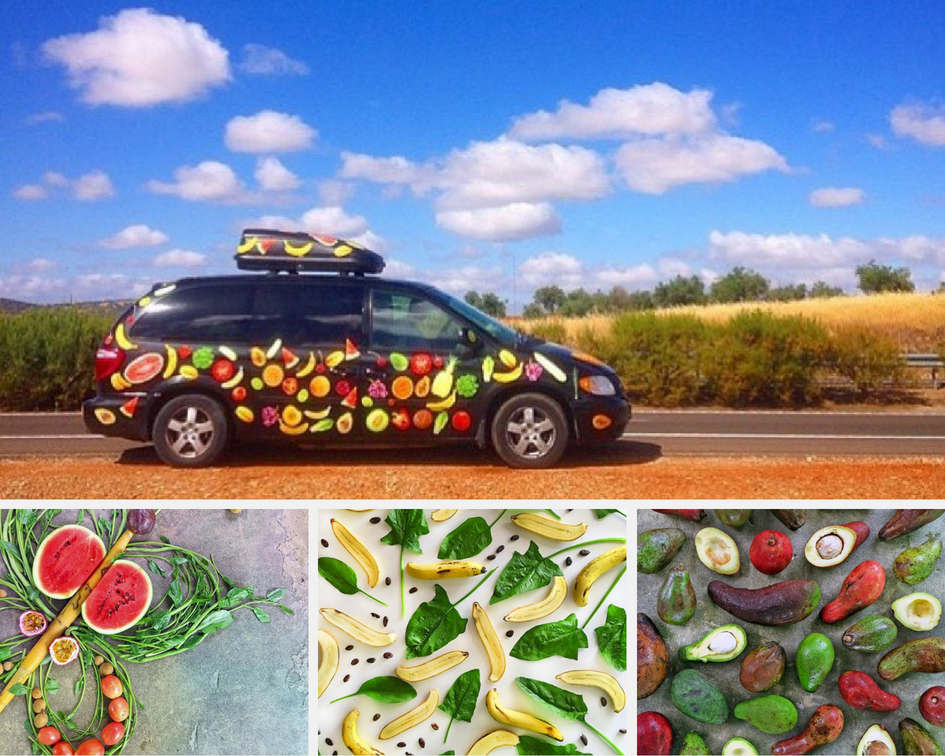
V: Do your children attend public school?
U: No, my kids are homeschooled and the main reason was the diet. Today I could handle this, but I just found that homeschooling has so many good things about it and my kids are happier and we just found a different way of teaching them. That's why we decided not to take them to school anymore.
V: Do you have any advice for families how to handle school, diet wise?
U: They need to be prepared choosing fruits which stay fresh for the longest time possible. One of my sons went to preschool for few months just because he was bored at home a bit during winter and I figured he might like that for a while and he did. I let him go for five hours to play with his peers and learn some toddler stuff. Some fruits just turn brown or mushy, so I would just give him a box of a cubed melon and cubed mango or some nuts and he had his meals. The key is to find foods that will taste good at school because then kids will throw them away. There is a problem with temptation or with friends who tease. The best is to explain to them first. Try to make them understand why they do not choose what their friends have, over what they eat. I know it's been problem for many parents, kids sometimes do not understand that yet and seem to ignore, and maybe nothing will happen. What I was doing with my daughter is explaining on many levels. Not only about her health, but also about the animals and about her future. I told her, if you choose something that's not healthy, at least make sure it's vegan, because you don't want to eat your little friends or their milk. You have to show to the child either some movie or explained to them. So they understand. It would be great having more children -friendly movies about this topic. There are many videos and even movies but all of them are for adults and a bit too radical for kids or even scary. There is a very nice website with some videos about going vegan for kids. Pre teenagers break the rules often because of their friends. But this is mostly because they don't understand or there's not enough support in their family. Maybe the family doesn’t follow the same diet, so the child is confused. That’s why it is so important to work on your mindset and do not treat this change as a temporary band aid. It is a beautiful journey that never ends.
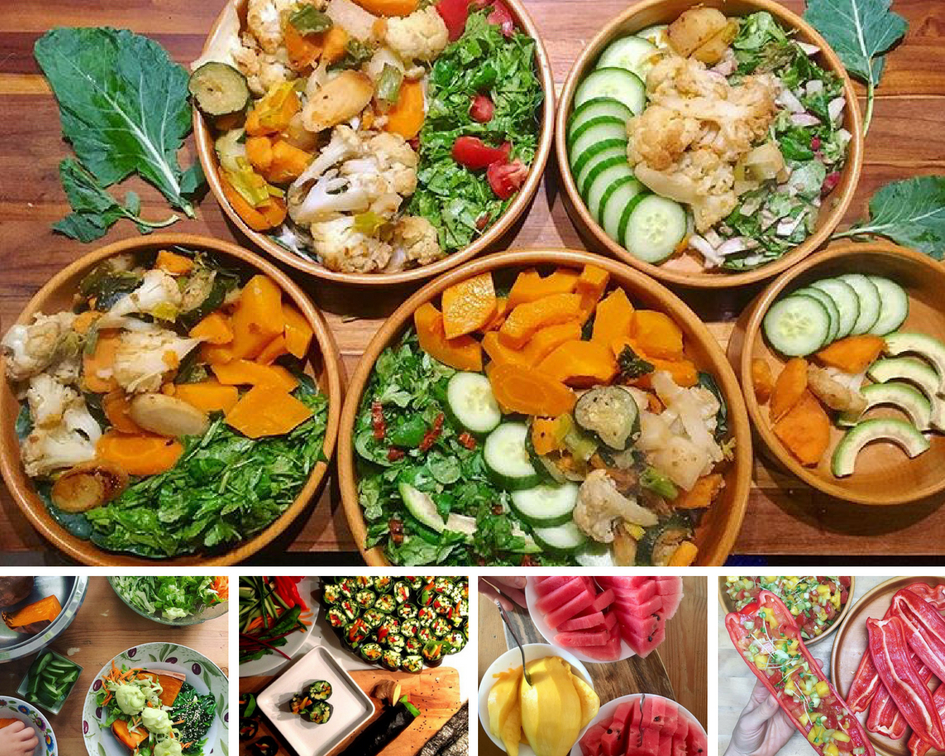
V: What does healing crisis mean?
U: It is a very important subject, as many times nobody really thinks about it until it happens. Our body, on a daily basis, for many, many years, didn't have a chance to detox. The body starts to have a chance to release a lot of things when we change our diet to easy digest foods. When we rush, wanting to see the results quickly, we don't transition slowly enough, we kind of change too suddenly. All we want is a quick result. So the faster you wanted to have the results, the biggest crisis we will experience. If we push too much, then our body is going to expel so much at one it will create a blockage. That can become a big problem to fix later, so I highly recommend not pushing when it seems to be stuck, rather wait and slow down with it. I would compare it to cleaning a house in 1 day, when you want to deep clean everything. The “healing crisis” may happen, because you have so much to fix in one day and that's not possible. You’re stuck with dirty windows, stuff on the floor, clogged sink, laundry to hang, closet to organize, pantry to clean, refrigerator, bathrooms and what else? And in just 2 hours your family is coming home and you need to prepare a dinner in between all that mess! So to avoid healing crisis, it's better to do it slowly. Take one day per each task and do a regular care, after a month your house is spotless ;) Slowly downgrade the diet and clean it up first from all the processed foods, and begin making all food at home. Then remove dairy, meat and then pay attention to sugar, or other things. It is a gradual process of removing things and this will help our body to fix, little by little and get ready and prepare.
V: When did it click to you, that being vegan is not just a diet?
U: It was a gradual process, but it was pretty much from the beginning. I was learning a lot of things while being a part of the community on Instagram. I was learning a lot about the ethical part right from the start. I have never been an activists and I think I will never be because I don’t have that kind of personality. On the other hand I'm pretty sure I introduced more people to Veganism at the same time, because I am trying to build the bridge and I give people chance to understand it. I truly believe that everything is very connected and when we understand that we can't just make food, and use our environment the way we want. My approach attracts people to try it first for their own health and through my teaching and especially my programs I am focusing a lot on the lifestyle changes and building a new mindset. For me it becomes very important on all those levels and also the environmental level. We don't use that much of packaging. I'm constantly finding little things in my life that I can fix. I tried to use less water, maybe less electricity, little things here and there. We do compost. When we walk on the street, my kids say, “Oh mom, I can pick the garbage.” They are learning to actually take care for our environment. Life has given me a mission to help people with eczema and I believe that at the same time I am building a bridge from the health point of veganism to the ethical part. In my ideal world I would love to see people support each other, those who are strong to reach out to those who want but don’t know how and help them when they make mistakes. I understand both sides.
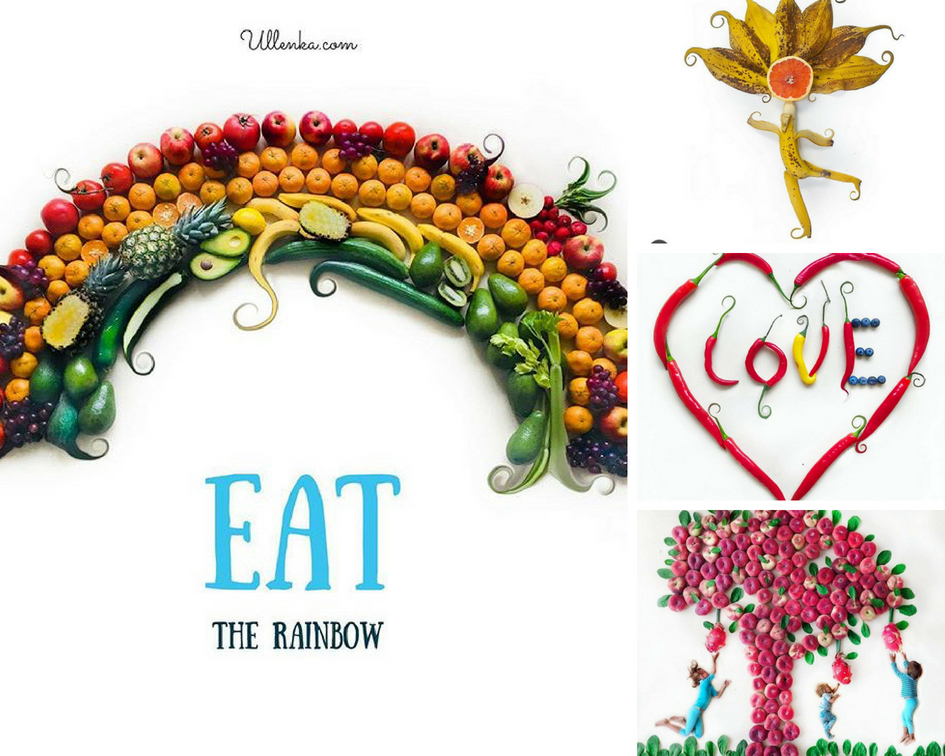
V: Can you tell me about your art?
U: Art is a bit too big word, but because I don't know how to call it, I call it fruit-art. I was inspired just by the plants itself. They are so beautiful. They are just so pretty. I started taking more and more pictures and I noticed that it relaxes me. I meditate when I'm doing it. I started to create mandalas and fruit images with my kids in them. It was very therapeutic for me while going through the hard times, when my kids were sick. I started doing more arrangements and taking a lot of pictures, my community on Instagram has been very supportive of my works and always gave me lots of love when I posted a new picture. It was easier when I’ve lived in a warm climate and I’ve had a lot of outside space, so today I don’t do it that much but I will keep doing it again, because it was really fun for me. Today I even offer T-shirts with my images; there is a little story behind a small brand that is coming. One day a woman from California approached me and told me her eczema story. Her son had eczema and she has healed him with my method from my book. She asked if we can make a business out of my photos, because she loves them all. We are building a website now. Me and Mari are good friends since few years now. She is my biggest fan ;) and always believes in me.
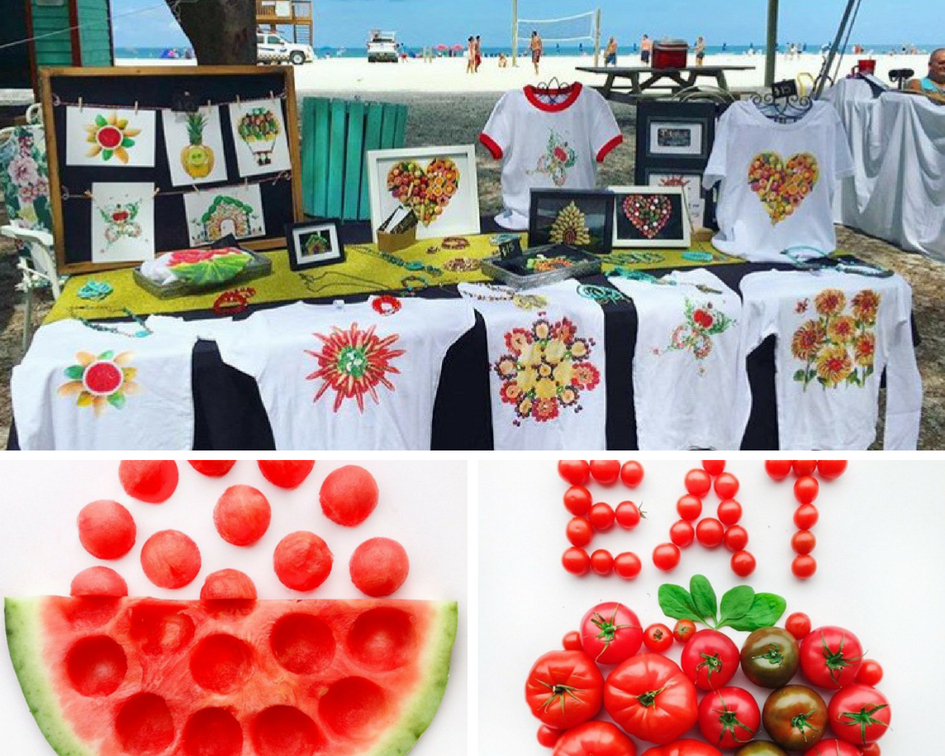
Photo credit: Ullenka
Riporter: Edit Horvath
You can read other interviews here:
With Jo Frederiks, about art and veganism
With Seb Alex, about veganism, Anonymous for the Voiceless and other way of supporting animal rights.
Dr Ruth Heidrich: A 36-year vegan survivor of Stage 4 breast cancer, and the first vegan to do the Ironman Triathlon. At the age of 83 she is still in perfect health and living an active life. She was also featured in the Forks over knives documentary.
With Marlena Roznberg about sailing, veganism and following your dreams.
Chef Kamila: Certified Food For Life Instructor & Vegan Chef. Owner of ChefKamila’s cooking school and licensed home restaurant
With Richard Watts, about Vegan SideKick, motivation, trolls and excuses.
With Mariia Goldscmidt from Tofu family, about being a fit mum and raising a vegan child.
We have created the biggest list of vegan related books if you need more information about veganism, looking for mouth-watering recipes, tips for raising vegan kids or children books for the lil ones.
If you are new to veganism, you might find this article useful: Vegan Starter Kit.
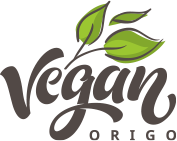
Follow us on: